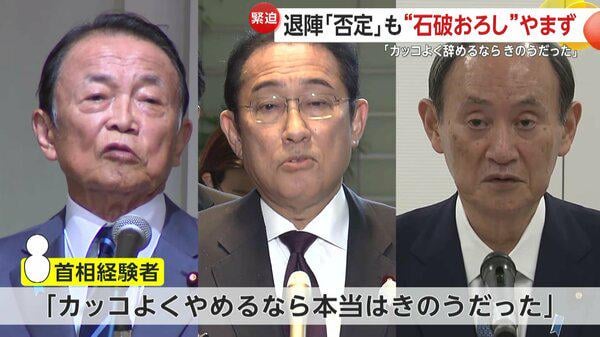
Prime Minister Shigeru Ishiba has reaffirmed his decision to remain in office following meetings with former Prime Ministers Taro Aso, Fumio Kishida, and Yoshihide Suga. Despite media reports suggesting he might resign, Ishiba denied such claims. However, within the Liberal Democratic Party (LDP), efforts to push him out, known as the “Ishiba ousting,” are gaining momentum. With the Japan-U.S. tariff negotiations now concluded, attention is focused on Ishiba’s future.
On July 24th, Akazawa, the Minister responsible for economic revitalization, returned from the U.S. after completing negotiations. Akazawa expressed satisfaction with achieving an agreement beneficial to both countries, including Japan’s commitment to investing $550 billion (about ¥80 trillion) in the U.S.
After meeting with the former Prime Ministers on the 23rd, Ishiba once again rejected the idea of resigning, stating, “There was no discussion about my future in the meeting.” However, one former Prime Minister noted that while they didn’t directly call for Ishiba’s resignation, the timing for leaving gracefully might have been the day before. This person emphasized that the meeting didn’t imply their consent for Ishiba’s continuation.
Within the LDP, the movement to remove Ishiba is intensifying. On July 24th, the Nara prefectural branch submitted a letter to Secretary-General Moriyama requesting a renewal of the party leadership, citing a loss of trust among party members due to Ishiba’s continued leadership.
Meanwhile, some LDP members are actively collecting signatures to hold a meeting questioning Ishiba’s accountability for the election loss, with a deadline of July 24th at 5 pm.
Former House of Representatives member Emi Kaneko commented on Ishiba’s decision to stay on, suggesting that the final decision is up to Ishiba himself. Kaneko noted that Ishiba seems determined not to let public sentiment drive him to resign.
The outcome of the “Ishiba ousting” movement remains uncertain. Kaneko observed that while the party pushes for a leadership change, cooperation with opposition parties is essential to advance policies. The opposition has declared they will not collaborate with Ishiba’s administration, potentially leading to political stagnation, a situation Ishiba himself warned against.
As the debate over Ishiba’s leadership continues, the focus is on how the LDP and Ishiba will navigate these internal challenges and the broader political landscape.
by MagazineKey4532
